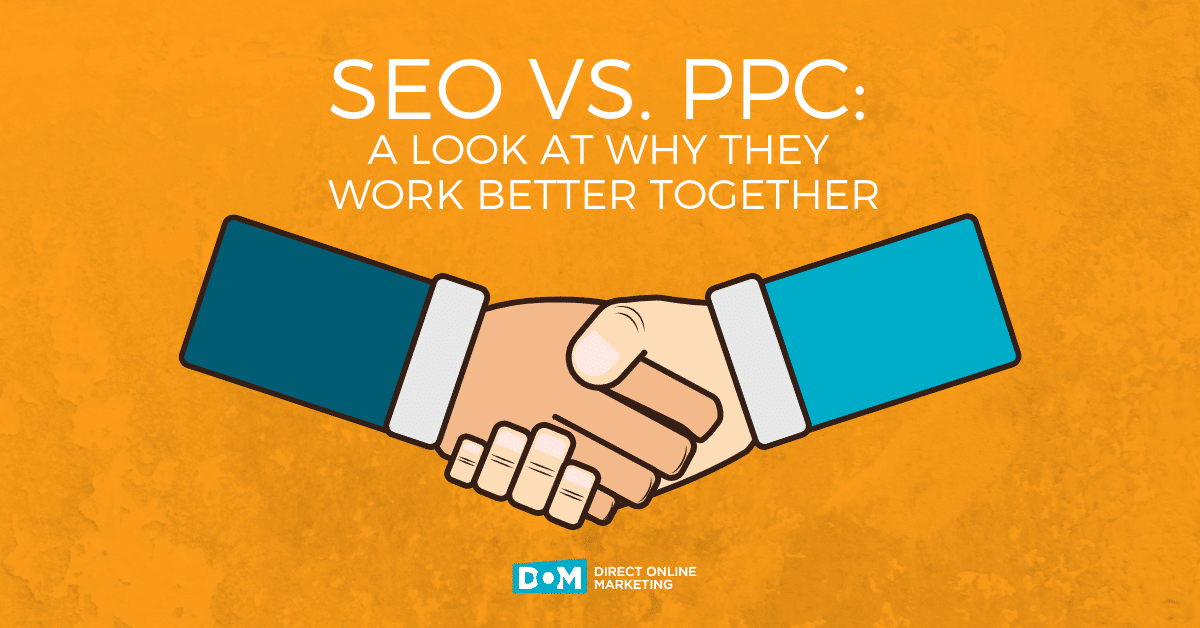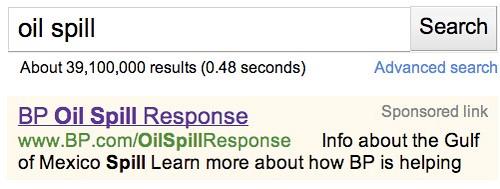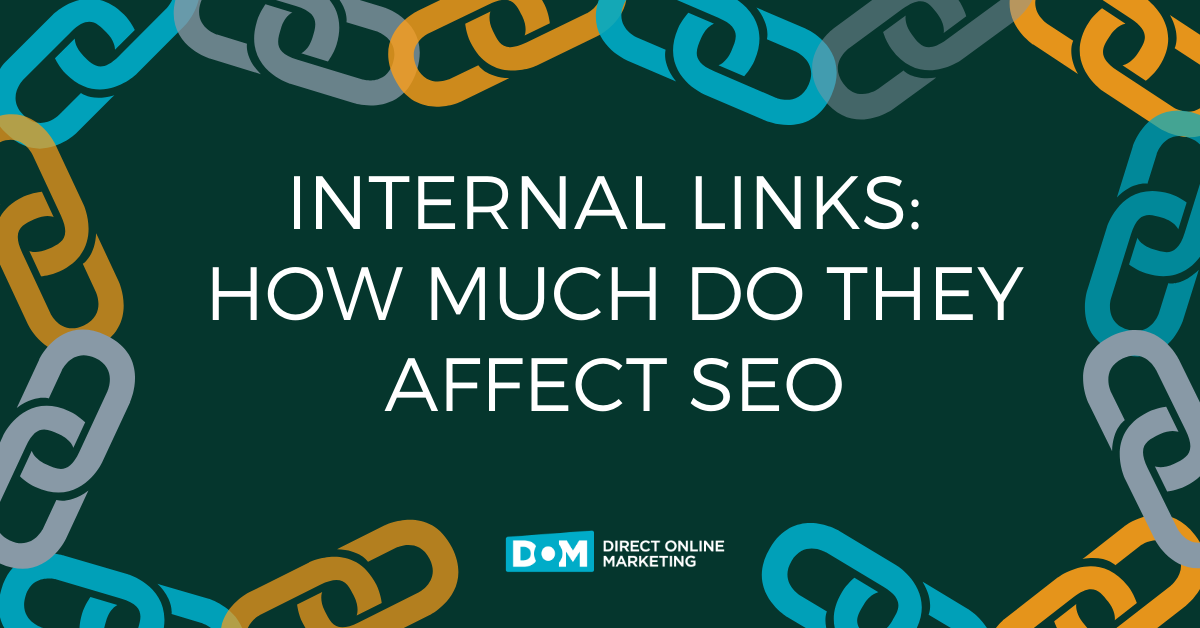
Virtually anytime you hop on Google to do a search, you’re going to see at least one advertisement that the search engine is compensated for on a pay per click (PPC) basis. But the chances are that you’re actually there for the organic listings. So are most other users, which is why search engine optimization (SEO) is most likely here to stay. No matter what link you click – Google wins. But as a marketer, if you don’t choose both as part of your digital strategy, you are left to choose a side in the debate of SEO vs PPC.
Most people can readily identify ads, yet they still click on them.
For our fellow cynics, it’s easy to think, “Why click on an ad when organic listings do the trick?”
Sure, PPC and SEO seem to be very different. In reality, we’re talking two sides of the same coin. They complement each other brilliantly.
Friends and colleagues always ask us, “Is PPC or SEO better for business?”
In this post, we’ll be sharing what we learned from Clutch’s survey, and why SEO and PPC complement each other so well.
It’s all about intent. SEO and PPC both reach people when they are searching online. Which is right for you? Here Justin provides 3 questions to consider. Your answers will inform whether you should pursue SEO or PPC or some mix of both.
Do people really click on paid search ads?
Let’s have a thought experiment.
For the average consumer, Google is a free service. Google is just one part of a multinational conglomerate called Alphabet Inc.
According to PriceWaterhouseCoopers, in 2020 Alphabet ranked as the fifth-largest company by market cap in the world. Fair to say they’re raking in a fair amount of cash, right?
Google Search is, by far, the biggest revenue generator for Alphabet.
So, where does the majority of Google’s earnings come from?
Ad revenue. And boy howdy, lots of it.
Most of Alphabet’s total revenue, in turn, comes from Google Ads. A portion of this total is earned from ads placed on YouTube and sites within Google’s display network, but paid search earns the lion’s share of those ad dollars that make up the majority of Alphabet’s total revenue.
Think critically about this—Alphabet wouldn’t be one of the biggest companies on the planet if it relied on “positive vibes” to keep the lights on.
By this fact alone, it would be logical to assume that a lot of people are clicking on those ads.
But these aren’t mindless zombies clicking on random ads.
Something fuels the reasoning behind those clicks.
Before we get into those reasons, it’s important to understand how search engines got here.
The Evolution of Search Engine Marketing… And The Beginning of The ‘SEO vs PPC’ Debate
Change is constant in the digital realm.
And yet, search engines remain as powerful now as they were two decades ago. The Internet has evolved from what it once was, and search engines have had to adapt along with it.
The real reason Google was and still is the leading search engine is that they’ve improved their product over time.
Google knows that user experience is always the most critical component of their success. It’s easy to be the top dog when your product is consistently superior.
The big secret behind why search engines will always be around?
It comes back to the singular goal of every search platform—satisfying intent.
We talked about intent quite a bit in a previous post. Keep in mind that search engines are designed to deliver content that best serves a user’s query.
All search engines are continuously trying to improve the quality of search results so users have a reason to keep coming back.
While satisfying intent explains why people use search engines, it doesn’t explain why anyone would ever click on an ad. Especially when 77% of people can confidently distinguish a search ad from an organic result.
SEO vs PPC and The Reasons Behind the Click
People click on ads, but why?
Most people click on ads because they are extremely relevant to their query. This makes sense because you’ll only end up throwing away money if your ads aren’t relevant.
But what’s interesting is when you consider that relevancy is also a core component of SEO.
We don’t want to minimize how important it is to optimize paid search ads.
Other brands also run search ads, and you want to do everything you can to increase the odds of users choosing your ad over the other guys.’
If you’re familiar with Google’s quality score, then you know that the more relevant your ad is, the more people will see it.
Even if most marketers see the channels as competitors – creating the endless SEO vs PPC debate – Google is ultimately trying to accomplish the same thing with both channels — satisfy user intent.
Now that we’ve hammered the concept of satisfying intent into the ground, we’ll admit that this doesn’t really explain how the two can work in harmony.
Choosing In The On-going Battle Of SEO vs PPC
Here’s a fundamental look at just how different they are:
- PPC costs money; SEO is “ free.”
- SEO is a long-term investment; PPC ads can launch within minutes.
- PPC copywriting is all about brevity; SEO content needs to be comprehensive.
- SEO professionals are left to decipher ranking factors through testing and cryptic forum posts from Google employees (no direct line of contact); Google provides training and customer support via email, phone, and forum for PPC.
Another reason people distinguish SEO and PPC from one another is that they engage different skill sets.
Below are a few high-level differences between PPC and SEO professionals:
- PPC requires experience with bidding on keywords, managing budgets, writing short ad copy, and analyzing a unique set of performance metrics.
- SEO professionals need to have a grasp of how Google’s search algorithm works. This means they need to have a tech-savvy, analytical, and creative mindset all at once.
We’re only scratching the surface when you compare SEO vs PPC.
If you’re looking for someone to definitively declare which is better for your business, we have to disappoint you.
Both approaches have unique strengths and require leveraging experienced professionals.
How to Use SEO & PPC Together
When combined, SEO and PPC can complement each other quite a bit.
Straight away you’re probably wondering:
“Can PPC help organic search rankings?”
We’re going to let you in on a secret.
PPC ads do not have a direct impact on your organic search rankings (and probably never will).
If Google were to reward brands that spend a lot of money on ads with more prominent organic rankings, this would undermine Google’s aim for the organic search experience. Which is to provide users with the organic listings that are most relevant to their search queries, rather than just the most relevant listings from the brands with the biggest pocket books.
Trust us on this—Google doesn’t want that. Google has risen to the top of the search engine hill by providing what people are looking for; Google doesn’t want to risk losing that spot by letting ad spend dilute the relevance of organic results.
Notice, though, that we said PPC doesn’t have a “direct” impact on organic rankings.
There are a few ways PPC and SEO can indirectly affect one another.
1) Share Keyword & Performance Data
Keywords play a part in both SEO and PPC.
Without extensive keyword research and strategic targeting, all SEO and PPC campaigns will fail.
Keywords are core to both disciplines.
What businesses often miss is that both can share keyword and performance data to strengthen their efforts.
Dynamic Search & Shopping Ads—
For dynamic search and shopping campaigns, ads are almost always configured to pull data directly from a site. That is, keywords don’t come explicitly into play.
However, if the source pages from those websites are not optimized for SEO, marketers are missing out on the opportunity to create better dynamic search and shopping ads. That is, if relevant text isn’t incorporated into a page’s metadata and H1 tags, then the page won’t perform as well as it could.
Site Search Keywords—
For websites with site-search functionality, Google Analytics will capture keyword searches from visitors.
The main goal of both SEO and PPC is to figure out what words or phrases clients and buyers are using to find your products and services.
Site search can yield valuable and indispensable insights into the mind of your target audience.
Converting Keywords & High-Performing Copy—
One of the downsides of SEO is that you can very rarely trace conversions to specific keywords.
PPC campaigns, on the other hand, generate loads of performance data on converting keywords. This keyword analysis can inform what keywords to add to an existing SEO campaign or how to reprioritize keywords in a PPC campaign.
Additionally, PPC campaign analysis can show which ad variations led to the most conversions. In turn, this can inform SEO efforts with writing titles and descriptions for your best content.
Sharing data is great, but the virtuous relationship between PPC and SEO goes deeper.
2) Increase Visibility & SERP Real Estate
Google has been banging the drum for years about the rise of mobile traffic.
In fact, mobile-first indexing is now one of Google’s most important ranking factors.
(Even for websites with mostly desktop traffic!)
Relying on SEO alone to get your business seen will be a challenge, particularly if you rank lower than the top three organic search results on page one.
If you do have a page-one ranking, though, PPC can supplement your chances of attracting even more search users to click.
If you run PPC ads alongside your organic listings, you may be wondering if paid ads cannibalize organic traffic.
According to some crazy in-depth research by a few statisticians over at Google, the opposite is true.
The study had a solid methodology and concluded that paid search ads result in an 89% incremental lift in organic site visitors; that is, people who see your paid ads become more likely to visit your site via organic search. Which is traffic a site would not have been able to receive without the presence of paid ads in search results.
We’ve actually seen this first-hand.
If you have considerable spending in Google Ads and suddenly pause all campaigns, traffic from other online channels will take a dip. The extent varies wildly, but it happens across verticals.
Tl;dr—
As Google pushes organic listings further down its results pages, PPC can help brands claim more “real estate” on page one.
But there’s one more way PPC and SEO can indirectly affect each other.
3) Maintain Consistent Branding Experiences
A fundamental principle of branding is that you should create a uniform brand experience for the various people who encounter your brand. Your brand should leave the same impression, no matter when or where someone sees it.
In the same vein as increasing your overall visibility, PPC and SEO should always be used in tandem to ensure consistency for branded searches.
How would it feel if every time someone searched for your brand name, the ads at the top were all competitors promoting their services or products?
Using both approaches increases your business’ visibility in search engines, so you can control the conversation.
Maintaining a consistent branding experience only becomes harder if SEO and PPC efforts are not geared toward searches for your brand.
Additionally, PPC can be used to offset potentially negative brand sentiment.
You may remember that over ten years ago, the Deepwater Horizon oil spill was a devastating environmental disaster.
Shouldering most of the public outrage, BP had a PR nightmare on their hands.
To help tell their side of the story and explain their plans to remedy the oil spill, BP launched PPC ads targeting keywords such as “oil spill” to send visitors to a BP news page.
The takeaway is that PPC is best for immediacy. In times of negative PR, running ads to help tell your side of the side of the story is something to keep in mind.
In case you didn’t catch it:
- Don’t create environmental disasters.
- Don’t send users to crappy, carelessly written landing pages.
Which is Better in the SEO vs PPC Debate?
Given a choice between only SEO or only PPC and we’d pick neither.
Not every company has the budget to sustain SEO and PPC campaigns simultaneously.
Still curious about which solution is best for your goals?
For that, you’ll need to leverage the insights of someone with experience in search engine marketing. We’re happy to recommend a couple of smart folks you can chat with to get the ball rolling
PPC and SEO are a match made in heaven. It would be a real shame if you didn’t unite them for search engine greatness.
To get more information on this topic, contact us today for a free consultation or learn more about our status as a Google Premier Partner before you reach out.




